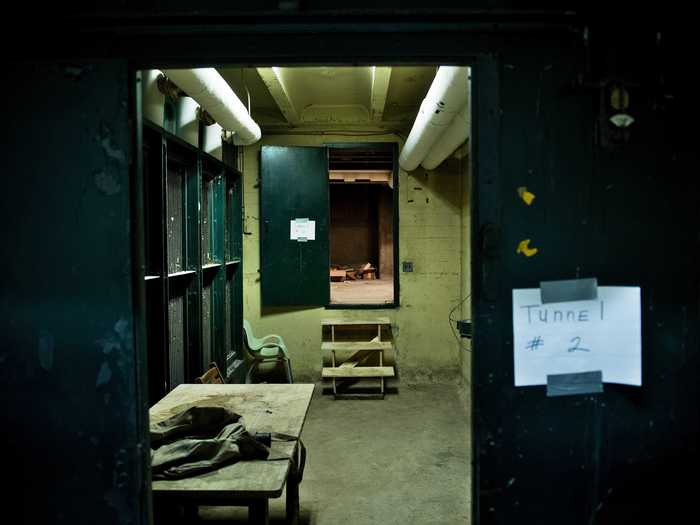
Bunkers across the US are now abandoned.Casey James / Luxe Realty Photography
During the Cold War, the United States went into defense mode.
As a result, the government built underground shelters to house defensive missiles and to provide a place of protection in the event of a nuclear incident. Five decades later, some of these bunkers still exist but are completely empty. With their crumbling walls, peeling paint, and rusted railings, these abandoned bunkers remain as a symbol of the Cold War.
Keep reading to take a look inside abandoned bunkers across the US.

In 1961, President John F. Kennedy sent out a letter to American citizens warning them about the threat of nuclear war. His solution: fallout shelters.
"We owe that kind of insurance to our families and to our country," his letter read. "The time to start is now. In the coming months, I hope to let every citizen know what steps he can take without delay to protect his family in case of attack. I know you would not want to do less."
Congress allocated $169 million to find locations in public and private buildings that would protect communities from nuclear attacks. One of these shelters was built under Oyster-Adams school in Washington, DC. After the Cold War, it remained untouched for decades.
In the basement, three steps lead to a green door. Behind the door, you will find the fallout shelter.

The Cold War lasted 45 years, but the fear of nuclear attack peaked during the '50s and '60s.

The bunker was designed to serve 100 people for two weeks, which was believed to be enough time to wait out the fallout, in the case of a nuclear attack.

A rubber seat was affixed to the top of the container to make it a more comfortable experience.

The abandoned bunker also has first aid kits, cotton swabs, and tongue depressors scattered about.

The bunker was decommissioned in the 1970s, and it now lies abandoned on a 50-acre prairie in Fairdale, North Dakota.

In this bunker, the US government kept missiles, which were ready to launch at a moment's notice. The bunker was built to act as a defense against incoming missiles.

"They're intact, but they show signs of abandonment," property manager David Keller told Military Times about the surrounding buildings. "They're rusty and in need of repair."

The missiles that were held in this bunker were 30 feet long, weighed 7,700 pounds, and could travel 7,000 miles per hour.

After 70 bidders, the final price was $52,500, but the seller did not accept the offer, according to Business Insider.

Just outside of Tucson in the middle of the Arizona desert, you will find the entrance to this bunker through a camouflaged doorway on the ground.

Before the entire complex was decommissioned in 1982, the underground bunker held the country's largest land missile for 24 years. Known as Titan II, the missile was never used.

Since the three doors are built to withstand shockwaves, they each weigh 7,000 pounds.

The peeling walls, rusted infrastructure, and damaged floors only hint at this bunker's historic past.

A Tucson resident bought the abandoned bunker for $420,000, Business Insider reported.

This bunker in Oracle, Arizona, was built in 1962 and also blends in with its desert surroundings.

Despite being decommissioned in 1984 and remaining abandoned for decades, the structure is surprisingly well preserved.

The sign on the door reads, "Smoking in bed prohibited."

Even though it was left neglected for decades, the well-preserved bunker remained connected.

The bunker sold for $500,000, according to Business Insider.
 US buys 81 Soviet-era combat aircraft from Russia's ally costing on average less than $20,000 each, report says
US buys 81 Soviet-era combat aircraft from Russia's ally costing on average less than $20,000 each, report says 2 states where home prices are falling because there are too many houses and not enough buyers
2 states where home prices are falling because there are too many houses and not enough buyers A couple accidentally shipped their cat in an Amazon return package. It arrived safely 6 days later, hundreds of miles away.
A couple accidentally shipped their cat in an Amazon return package. It arrived safely 6 days later, hundreds of miles away. 9 health benefits of drinking sugarcane juice in summer
9 health benefits of drinking sugarcane juice in summer
 10 benefits of incorporating almond oil into your daily diet
10 benefits of incorporating almond oil into your daily diet
 From heart health to detoxification: 10 reasons to eat beetroot
From heart health to detoxification: 10 reasons to eat beetroot

Copyright © 2024. Times Internet Limited. All rights reserved.For reprint rights. Times Syndication Service.